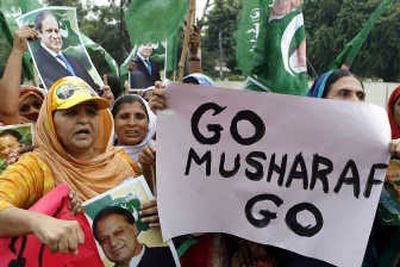Musharraf trims al-Qaida pursuit

WASHINGTON – Political turmoil and brazen attacks by Taliban fighters are forcing Pakistan’s president to scale back his government’s pursuit of al-Qaida, according to U.S. intelligence officials.
The development threatens a pillar of U.S. counterterrorism strategy, which has depended on Pakistan to play a lead role in keeping al-Qaida under pressure in order to reduce its ability to coordinate future strikes.
President Pervez Musharraf, facing an election in October and confronting calls to yield power after years of autocratic rule, appears too vulnerable to continue pursuing counterterrorism operations for the United States, the intelligence officials said.
At the same time, the Pakistani military has suffered embarrassing setbacks at the hands of militants in tribal areas bordering Afghanistan where Osama bin Laden and other al-Qaida figures are believed to be hiding.
As a result, U.S. intelligence officials said, the conditions that have allowed al-Qaida to regain strength are likely to persist, enabling it to continue training foreign fighters and plot new attacks.
“We are worried,” said a senior U.S. counterterrorism official who monitors Pakistan’s pursuit of al-Qaida in the rugged frontier region.
If Musharraf is removed from office or agrees to a power-sharing arrangement with political foes, there are also concerns that the “change in government could well mean a diminution of cooperation on counterterrorism,” the official added.
A senior U.S. intelligence official said Pakistani retrenchment appears to have begun.
“We’re already beginning to see some signs of that,” the official said, citing a series of reversals by the Pakistan military in recent weeks.
“In the next few days we’re probably going to see a withdrawal of forces that the Pakistanis put there,” the intelligence official said, adding the move could solidify a “safe haven, where the leadership is secure, operational planners can do their business and foreigners can come in and be trained and redeploy to the West.”
Over the years, Musharraf’s commitment to rooting out al-Qaida and Taliban elements has sometimes been questioned. Last fall, the president struck a peace agreement with tribal leaders in North and South Waziristan, scaling back military operations in return for a pledge that the tribes would rein in foreign fighters.
Instead, American intelligence officials said the deal took pressure off al-Qaida at a critical time, enabling it to regroup and re-establish ties with terrorist affiliates in other parts of the world.
In recent months, Musharraf has sent troops to the tribal areas, particularly after a series of suicide bombings by militants who vowed revenge after a July showdown in Islamabad, the capital city of Pakistan, in which government forces stormed a radical mosque.